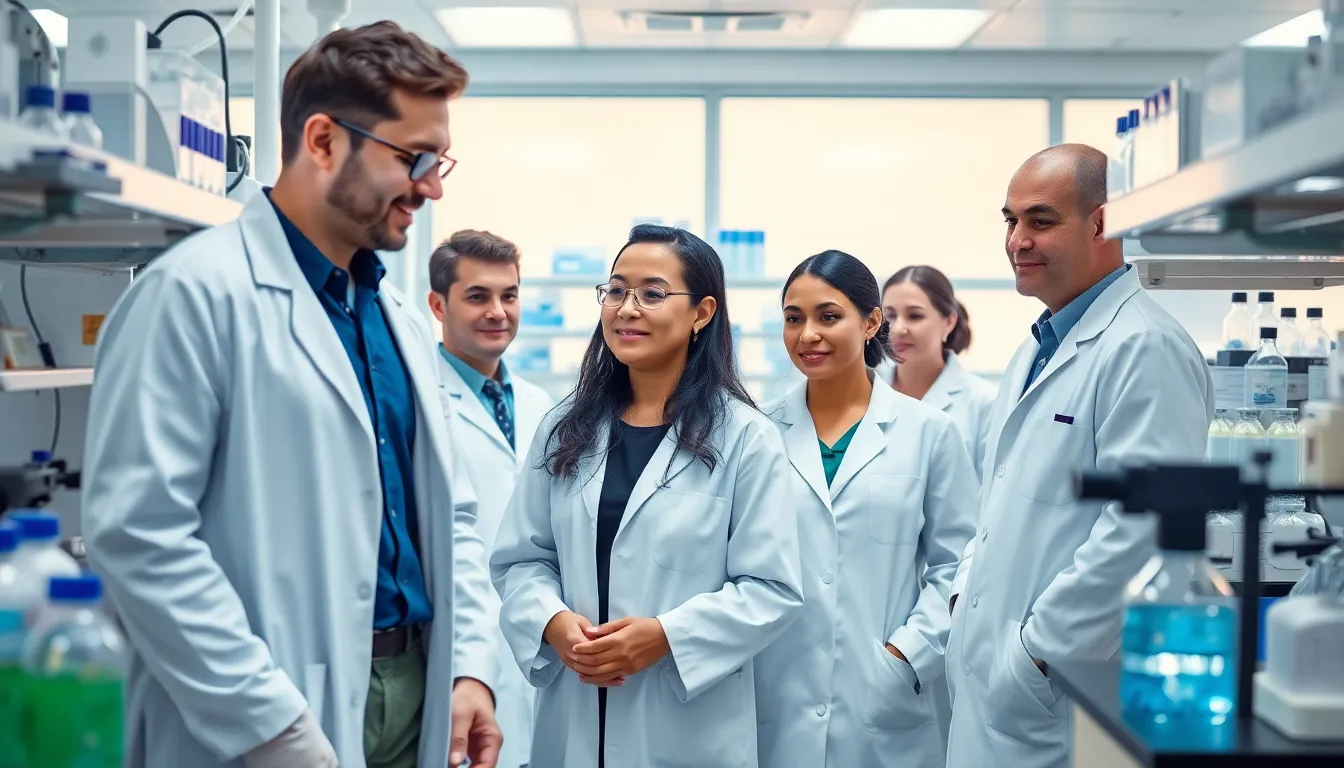Table of Contents
ToggleIn a world where science fiction meets reality, biotechnology services are the unsung heroes of innovation. They’re the wizards behind the curtain, conjuring up solutions that tackle everything from disease prevention to agricultural advancements. Imagine a lab coat-clad superhero, armed with pipettes and petri dishes, ready to save the day—well, that’s the essence of biotechnology!
Overview of Biotechnology Services
Biotechnology services encompass a range of activities focused on utilizing biological systems and organisms. These services play a vital role in sectors like healthcare, agriculture, and environmental management. Agents of advancement, they include research and development, laboratory services, and regulatory support.
Research and development form the backbone of biotechnology services. Companies engage in discovering new drugs and therapies, focusing on treatments for diseases such as cancer and diabetes. Innovations in genetic engineering also lead to more resilient crops, enhancing food security.
Laboratory services support numerous processes. These services include testing, analysis, and quality control, ensuring products meet regulatory standards. A variety of techniques, such as DNA sequencing and cell culture, allow scientists to study organisms more effectively.
Regulatory support includes navigational guidance through complex approval processes. Compliance with guidelines set by organizations like the FDA can shorten the time it takes to bring new products to market. Effective biotechnology service providers understand the importance of clear documentation and precise communication with regulatory bodies.
Additionally, contract research organizations offer critical support to biotech firms. These organizations provide specialized services, enabling smaller companies to focus on innovation while outsourcing non-core functions. By collaborating with experienced partners, biotech firms can optimize their resources and enhance efficiency.
Biotechnology services cover a diverse array of offerings that significantly impact various industries. Characterized by innovation and scientific rigor, these services contribute to solving pressing global challenges, transforming ideas into tangible solutions.
Key Areas of Biotechnology Services

Biotechnology services encompass several critical areas, contributing significantly to advancements in various fields. Each area plays a crucial role in shaping innovative solutions to global challenges.
Research and Development
Research and development stand at the forefront of biotechnology services. This process focuses on discovering new drugs and therapies that target diseases such as cancer and diabetes. Innovative techniques in genetic engineering enhance food security by developing crops with improved traits. Collaboration between scientists and researchers accelerates the translation of discoveries into viable products. Various funding opportunities drive the research agenda, ensuring progress toward addressing urgent health and agricultural needs.
Clinical Trials and Testing
Clinical trials and testing represent essential components of the biotechnology service landscape. These processes evaluate the safety and efficacy of new therapies and medical devices before public use. Phases of clinical trials, including phase I, II, and III, assess various parameters from dosages to treatment effects. Regulatory agencies oversee these trials, ensuring adherence to scientific and ethical standards. Robust data collection during trials facilitates informed decision-making for further development and market introduction.
Manufacturing and Production
Manufacturing and production processes ensure that biotechnological products reach the market efficiently. Facilities streamline production, utilizing advanced technologies to create biologics and pharmaceuticals. Quality control protocols guarantee that products meet strict regulatory standards throughout manufacturing. These facilities often incorporate automation and scalability to enhance efficiency and reduce costs. Investments in manufacturing infrastructure support the increasing demand for biotechnological innovations in healthcare and agriculture.
Benefits of Biotechnology Services
Biotechnology services offer significant advantages across multiple industries. These benefits contribute to innovation, efficiency, and cost savings.
Cost-Effectiveness
Cost-effectiveness stands out as a primary advantage of biotechnology services. Organizations benefit from reduced expenses associated with drug development. For instance, biotechnological processes often lower the need for extensive laboratory resources and materials. By streamlining procedures, companies can allocate budgets more efficiently. Moreover, biotechnology helps shorten the development timeline for new products, directly impacting overall costs. Many biotech solutions lead to fewer failures during testing phases, which translates to financial savings. With lower production costs, businesses can maintain competitive pricing in the market. This financial efficiency boosts accessibility for consumers.
Enhanced Efficiency
Enhanced efficiency is another crucial benefit of biotechnology services. Many processes in biotechnology utilize automation that accelerates research and development phases. For example, automated systems can conduct multiple experiments simultaneously, speeding up data collection. Improved data analytics also enhance decision-making processes, allowing for faster responses to market needs. Advanced genetic engineering techniques make modifications more precise, minimizing time spent on trial and error. In clinical trials, streamlined methodologies ensure quicker evaluation of new therapies. Overall, enhanced efficiency in biotechnology translates to quicker access to vital products and services, benefiting both providers and consumers alike.
Challenges in Biotechnology Services
Biotechnology services face multiple challenges that impact their effectiveness and potential for growth. Regulatory compliance and ethical considerations are among the foremost hurdles.
Regulatory Compliance
Regulatory compliance plays a critical role in biotechnology services. Organizations must navigate complex frameworks set by agencies like the FDA and EMA. Compliance with Good Manufacturing Practice (GMP) ensures the safety and quality of products. Keeping abreast of evolving regulations requires ongoing training and resources. Failure to adhere to these standards can lead to delays in product approval. Additionally, non-compliance may result in significant financial penalties and reputational damage. Maintaining robust documentation and standard operating procedures helps mitigate these risks, enabling successful product launches.
Ethical Considerations
Ethical considerations pose significant challenges in biotechnology services. Issues surrounding genetic manipulation and stem cell research raise public concern and ethical debates. Stakeholders must address the implications of altering organisms and the potential consequences for biodiversity. Public trust is essential for the acceptance of biotechnology solutions. Transparency and communication with the public foster understanding and alleviate fears. Developing ethical guidelines requires input from diverse expertise, including bioethics, law, and social science. Balancing innovation with ethical responsibility is key to advancing biotechnology while respecting societal values.
Future Trends in Biotechnology Services
Biotechnology services are poised for significant transformations in the coming years, driven by innovations and evolving market needs.
Innovations and Technology Advancements
Emerging technologies promise to reshape biotechnology services significantly. CRISPR and gene editing techniques facilitate precise modifications in genetic material. Furthermore, artificial intelligence enhances data analysis in research, streamlining drug discovery. Collaboration between tech companies and biotech firms boosts development of wearables for health monitoring. Advanced bioproduction methods enable sustainable manufacturing of biopharmaceuticals. Innovations in regenerative medicine expedite treatment options for various diseases. Continuous advancements in automation improve operational efficiency in laboratories.
Market Growth and Opportunities
The biotechnology market projects substantial growth, presenting numerous opportunities for businesses. According to recent statistics, the global biotechnology market is expected to reach $727.1 billion by 2025, growing at a CAGR of 7.4%. Increased investments from venture capitalists enhance funding for biotech startups, promoting innovation. Expanding healthcare needs drive demand for novel therapies in chronic disease management. Rising awareness of personalized medicine encourages tailored treatment options. Additionally, advancements in agricultural biotechnology pave the way for improved crop yields and sustainability initiatives. These factors collectively enhance the landscape for biotechnology services.
Biotechnology services stand at the forefront of innovation with their ability to address critical challenges in healthcare, agriculture, and environmental management. As they evolve through emerging technologies and collaborations, these services will continue to reshape industries and improve lives.
The importance of navigating regulatory landscapes and ethical considerations cannot be overstated. Organizations must remain committed to maintaining high standards while fostering public trust.
With a promising market outlook, the future of biotechnology services is bright. As advancements in personalized medicine and sustainable practices take center stage, the potential for groundbreaking solutions is limitless.



